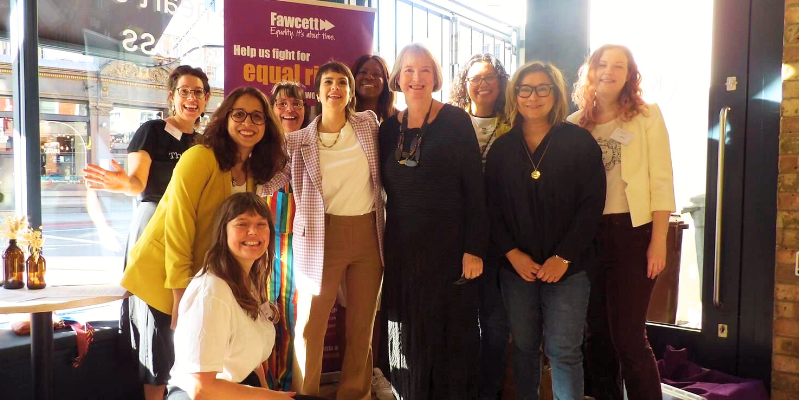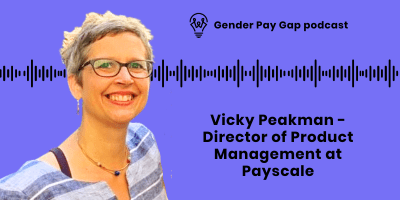Alesha De-Freitas is head of policy, research and advocacy at the Fawcett Society, a gender equality charity. Before joining Fawcett, she worked in the Civil Service for 15 years in economic, regulatory and trade policy, most recently as deputy director for competition policy. In 2017, Alesha was awarded an MBE for services to the digital single market.

“If you’ve got a wealth of intelligent, educated, trained, passionate women who are being underutilised because society is not set up for them to succeed then we all lose out.”
Putting gender equality front and centre
I went to Warwick University and studied economics and politics, and then after leaving university, I joined the Civil Service, more or less immediately. For 15 years I was a civil servant working on economic policy, which included everything from investment in offshore wind turbines to encouraging European countries to sign up to climate change agreements and promoting digital technology across Europe, so my work was internationally focused.
My work was quite different from what I’m doing now but I’ve always been a passionate feminist and while I was in the Civil Service I was very involved in their diversity and inclusion work, and in thinking about how to make it more inclusive for people like me because I didn’t have an Oxbridge background, I didn’t have a private school background and I’m mixed race. There has been progress around inclusion but I think the Civil Service still has a way to go in making sure all people can make their contribution informed by their own life story, and not just based on a ‘model’ civil servant.
I spent 15 years in the Civil Service and I became a member of the Fawcett Society when this job came up so I thought it would be a good way to put my policy skills to use to further gender equality in the UK rather than thinking of it as a bit of an add on to my career.
About the Fawcett Society
Fawcett is a membership-based society. We fight for women’s rights in the UK, at home, at work, and in public life. We are rooted in the suffrage movement, so we’ve got over 150 years of campaigning behind us and we focus on the drivers of structural inequality.
We very much believe that women are queuing up to lead. They want to take these positions in society, but we don’t need any more training and we don’t need any more networking or confidence-boosting measures, but actually what we need is to have the barriers that prevent us from realising our full potential removed.
We work across all different sections of society and community, making sure that women’s voices are heard on the issues that they care most about. We’re in the midst of examining our campaigning activity (more on that on in a moment…) but our big areas of work in the past have been on women’s representation in the workplace and how to close the pay gap, and also women’s representation in public life and how we get more women into positions of power.
Working across the whole spectrum of issues affecting women
My role is head of policy, research and advocacy. On the research side, we do a lot of research into issues that we care about. So, for example, in the last year, we’ve published reports on how employers support women who are going through fertility issues, and what is the experience of women doing that. We’ve also researched into the support for women returning to work after maternity leave, and we’ve done a report on women in the tech industry and the barriers that are stopping them from progressing and leading.
We are in the final stages of a big report looking at childcare reform internationally and what England can learn from it.
I spend a fair amount of my time doing research, which might involve talking to women in those situations, running focus groups, talking to employers, running studies or doing reviews. There’s also a part of my job which is about influencing and advocacy. That is about talking with other people who are working on similar issues and finding out what are the big policy recommendations? What do they see as the big issues for women? And how do we work together to effect change? I’m often out speaking with MPs or policymakers to tell them what we think needs to change, and what they need to do if they want to make a real impact.
The Fawcett Society is the only organisation that works all the way across the whole spectrum of issues affecting women, including sexism and misogyny. A lot of other partners that we work with have specialisms in things like violence against women or child care, so we try and coordinate our campaigns as best we can.
Tearing down the structural barriers around the gender pay gap
Equal pay is about is a concept enshrined in law that two people who are doing the same job jobs of equal worth should be paid the same amount of money. We know that that is still not always the case. It is harder to enforce than it should be but it’s about specific people who do very similar things.
The gender pay gap is far broader. It comes with all of the structural barriers that prevent women from realising their full earning potential, and that can be things like the fact that more women work part time than men, and that not only then do they have the impact of lower amounts of money that they take home at part time jobs, but part time jobs typically lower paid per hour, and have fewer promotion opportunities, than full time jobs. Also, occupational segregation means that women are likely to be in roles where they are paid less than the sorts of jobs that men do.
There are also issues more broadly around child care and the motherhood penalty, and also around the intersection of sexism and racism, so lots of different factors contribute to the gender pay gap.
Broadly speaking, occupational segregation means that women are likely to be in roles where they are paid less than the sorts of jobs that men do.

In financial services, bonuses can contribute to pay gaps too. Wherever you have cultures where there is a lot of discretion without a lot of clarity over the output per worker, then you have an opportunity for biases to creep in whether, intentional or unintentional yes, and it’s certainly like that where a huge amount of your performance is judged on perception rather than what you’re actually
In the tech sector report we did, which I mentioned earlier, one of the fascinating things we found is that even though there’s a big focus on getting more women into tech, the women who get into the sector are much more likely to then leave it. Some of that was around them being treated as more junior.
Women would talk about when you show up to a meeting and your contribution as a software engineer isn’t appreciated. There was also a sense of women who did have tech skills and who were very emotionally literate were told that they would be better served in project management, or marketing, or event management, but all of these other areas don’t attract the same pay as the technically skilled work.
There are all sorts of quite insidious cultures that exist which stop women from getting those highest-paid jobs. It does vary according to the profession and the business that you’re in but misogyny is so intrinsic in our culture and it can be hard to spot it and identify it for what it is sometimes because it just pops up absolutely everywhere. There is a large amount of research into the fact that women take on roles like organising a Christmas party or organising team meetings that can often be sold as being a good opportunity to show leadership, but nobody actually gives you any credit or promotes you off the back of it. I saw that during my time in the Civil Service.
To the gender segregation point, when you look at the sorts of jobs that women do such as caring that are considered to be unskilled or low-skilled, because women are just meant to be naturally good at taking care of people, whether that’s hospitality, whether that’s working in adult social care, or as a nursery worker, or whatever.
The reality is though that caring doesn’t come naturally. It is a learnt skill. Anyone who hasn’t done it and then tries to take it on is always going to be flabbergasted by how much work it is, yet it just doesn’t get recognised in the pay packet.
Speeding up progress on closing the gender pay gap
There is progress towards closing the gender pay gap, but it’s painfully slow. What gender pay gap reporting has done is made it a lot easier to actually track it but what it hasn’t done is given enough of a push to employers to take real steps to close it.
Until the gender pay gap reporting regulation ensures that companies and businesses have to create action plans and address their progress against those you will always get businesses who just don’t buy into the arguments for equality and so they just don’t put enough time and effort into it.
Some of the interventions that can make the biggest difference in terms of closing gender pay gaps are flexible working. This week new legislation comes into force removing the requirement for an employee to have 26 weeks’ continuous service before they can make a formal flexible working request. This means the right to request flexible working becomes a ‘day-one’ right, which is a step forward.
All jobs should be advertised as flexible with the recognition that just because you have flexibility about the way you work this doesn’t make you any less of a good employee. You can still be productive; you can still be as focused on your career even if you’ve got other things going on outside. The quality of part time roles improves alongside the availability of them.
Other things that we want to see are an end to asking about salary history. The job should advertise salary ranges, which should be based on what that person is there to contribute. It shouldn’t be based on what that person was earning before, because we know that that allows inequality to just basically be imported from firm to firm, and that men are known to exaggerate their previous salaries more than women do, so they get larger pay increases.
Finally, from a societal point of view, one of the biggest drivers of the gender pay gap is the motherhood penalty. What happens to a woman in the five years after she gives birth, how long she’s taken out of the labour market, and what are the caring patterns she follows domestically when she comes back to have an impact on the rest of her career.
Reform of the childcare system is fundamental to allow women to make the choices that are right for them and their families. Childcare needs to be significantly cheaper, more accessible, and not just focused on working women, but focused on all women, so that all women can make the decisions around the balance of work and care that work best for themselves and their families.
That needs to be set alongside reforms to parental leave so that women can afford to take maternity leave, because at the moment if you’re on statutory maternity pay it would almost leave you destitute, which is unacceptable in our country.
Men are not incentivised to take statutory paternity leave, let alone shared parental leave. We need to see reform of the system so that care is shared more equitably between parents. This transforms people’s perspective on care too. Staying home with the baby can be perceived as a very ‘easy’ option until you do it and you realise how hard it is and how painful it can be (alongside the joy, of course!).
We know a lot of men want to stay home and take care of their children, but the system mitigates against them doing it and then you fall into caring patterns where the woman is the primary carer and the man is the secondary carer, and so the mother takes on all of the extra burdens for the rest of that child’s life. Changes to parental leave can make a real difference in disrupting those gender norms.
These reforms are not about benefiting women at the expense of men. It is about creating a stronger and better society, and there’s so much evidence out there that more diverse firms and more diverse leadership are more profitable.
Feminism isn’t about economics it’s about equity. Nevertheless, we need reforms because we need our economy to grow. If you’ve got a wealth of intelligent, educated, trained, passionate women who are underutilised because society is not set up for them to succeed then we all lose out.
Join us!
I’d encourage the Womanthology community to follow our socials and join the Fawcett Society as a member. You can find out more about becoming a member here:
https://www.fawcettsociety.org.uk/membership
We’re not funded by the government and we are very keen for people who are committed to what we do to join us and become part of our movement.
Over and above that, we’ve got reports out. On 15th April we have an event on childcare reform, as I mentioned. We’ve looked at five different countries, how they’ve transformed their systems and what we as England can learn in order to catch up with everybody else.
We’ve also got a report coming out over the summer about public harms and the way that public institutions in the UK cause harm to women and girls, particularly black women and girls. We’re looking at the education system, the policing system and mental health services and what we know about those, and also, crucially, how they can be transformed to better support the people they’re trying to serve.
Finally, we’ve got a new project kicking off very soon on feminist AI. There are a lot of risks to AI that we want to understand and act against, but there are also real opportunities for AI to further equality and justice.

Coming up next
We’ve got loads of exciting stuff planned for the summer. I think it’s quite a gloomy time politically so I’m hoping that we can see a few more chinks of light over the summer. I don’t know if that’s a bit too ambitious but I hope so.





